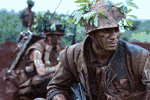The military struggle in Vietnam
The Vietnam War was a military struggle fought in Vietnam from 1959 to 1975. It was started by the Communist guerrillas (the so-called Vietcong) in the South, whom were backed by Communist North Vietnam, in an attempt to overthrow the South Vietnam government.
The start of the Vietnam War
Ngo Dinh Diem was overthrown and killed in a coup d'etat in 1963 by his own generals causing political confusion in South Vietnam. The security in South Vietnam continued to deteriorate putting the Communists in reach of a victory. By 1965, the US president Lyndon Johnson approved regular bombing of North Vietnam to prevent the total collapse of the Saigon regime by the dispatch of troops and marking their overt entry into the war. United States forces landed at Da Nang and began fighting in Vietnam.
The US intervention caused problems for the Communists, forcing them to continually send North Vietnamese armies to the South, but this did not deter them from the struggle. This situation was challenged in January 1968 when the Vietcong staged the bloody Tet Offensive by simultaneously attacking over 40 towns and cities in the South, but they failed to capture any. The Johnson administration decided to pursue a negotiated settlement. After Ho Chi Minh died in 1969 and was succeeded by Le Duan, the new US President Nixon continued the policy of ex President Johnson and gradually withdrew US troops.
US pulls out of the Vietnam War
In 1973 the United States ended its military involvement in the Vietnam War and in 1975 South Vietnam surrendered to northern forces. Thousands of Vietnamese began fleeing the country. Finally in 1976 North and South Vietnam were unified under a Communist government and Saigon was renamed Ho Chi Minh City.
The Vietcong recruited a guerrilla army to pursue a war of ambush, terrorism, and sabotage. By 1965 the Vietcong was strong enough to form main force units to fight pitched battles with the South Vietnamese army in the countryside, although not in the urban areas which stayed under Saigon government control.
Instead, their ranks were decimated and they had to revert to guerrilla tactics whilst the North Vietnamese regular army assumed responsibility for the main fighting against the forces of South Vietnam and its foreign allies, especially the United States.
Source: textbook 788-808
Vietnam War Wikipedia
http://www.youtube.com/watch?v=5KBPgqSgku0





